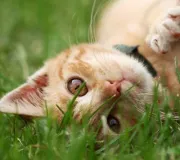Have you recently decided to bring a little feathered friend into your household? Colorful, enchanting, and musical, our avian pals make wonderful pets, and can truly liven up your home. Caring for a bird is quite different than taking care of a dog, cat, or pocket pet, however, so first time bird owners face a bit of a learning curve. One area that bird owners need to become familiar with is learning what poses dangers to birds. Many common household items can be truly hazardous to your winged pet! In this article, your St. Lucie County vet discusses household dangers for birds. For more information on keeping birds as pets, see the article ‘Basic Parrot Care‘.
Fans
Ceiling fans are especially dangerous, because it’s so easy to forget about them. Your little pet can seriously injure herself if she flies into a ceiling fan. Always make sure to turn ceiling fans off before letting your winged buddy out of her cage.
Fumes
Poor air conditions are one of the biggest household dangers for birds. Scented candles, aerosol sprays, perfumes, cigarette smoke, and the fumes from cleaning agents are all very hazardous for your winged pal. Kitchen fumes are also a danger, as food and cookware can release fumes that are harmless to us but very toxic to birds. Keep Polly’s cage away from the kitchen, and make sure she’s only breathing pure air.
Windows
Sadly, many birds have injured themselves by flying into glass windows or doors. When Polly is enjoying some time out of her cage, she should be monitored at all times.
Water
Toilets with open lids, sinks filled with dishwater, and even a pot of water on the stove are all very dangerous for birds, who can easily fall in and drown. Keep toilets closed, and don’t let your bird fly free when you’re cooking or doing dishes.
Other Pets
Sure, you’ve seen some adorable videos of birds happily interacting with cats or dogs, but don’t assume that it’s safe for you to let your pets loose around each other. Even if your cat or dog doesn’t seem to view your bird as prey, instinct can take over at any time, and it only takes one swipe of a paw to seriously injure your feathered friend. Play it safe, and don’t let Polly loose around your other pets.
Do you have any questions about caring for a bird? For comprehensive health check-ups and guidance on your bird’s well-being, consider our ‘Veterinary Diagnostics’ services. Please contact us, your St. Lucie County vet clinic!

